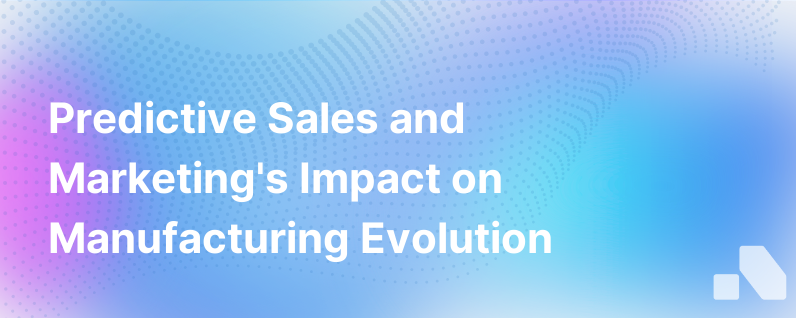
Harnessing the Power of Predictive Sales and Marketing in Manufacturing
Manufacturing has long been seen as a pillar of economic growth, a sector driven by efficiency, innovation, and productivity. However, traditional manufacturing is facing a paradigm shift, influenced by a rapidly transforming landscape characterized by the rise of digital technologies, changing consumer behaviors, and increased market competitiveness. In this evolving ecosystem, predictive sales and marketing emerge as natural successors to legacy business practices, offering manufacturers a forward-thinking strategy to not only survive but to thrive in the modern economy.
At the core of this evolution is the wealth of data generated by manufacturers, which when combined with advanced analytics, can unlock predictive capabilities, transforming how products are designed, marketed, and sold. These predictive models feed into every aspect of the manufacturing process, infusing a data-driven mentality into operations traditionally guided by intuition and experience. Let's explore further how predictive sales and marketing methodologies are revolutionizing the manufacturing industry.
The Shift Towards Data-Driven Decision Making
The manufacturing sector, albeit efficient in production, has often lagged behind in adopting cutting-edge sales and marketing techniques, largely sticking to relationships and time-tested processes. However, with the advent of Industry 4.0 and the Internet of Things (IoT), manufacturers are now equipped with ample data regarding their operations, supply chains, and customer behaviors. The integration of real-time data analytics into sales and marketing enables manufacturers to forecast trends, adapt to market demands, and implement proactive strategies that were previously unattainable.
Predictive Sales: Anticipating Customer Needs
Predictive sales take cues from large datasets to anticipate what customers will need before they even know it themselves. For manufacturers, this means building algorithms that analyze past purchasing patterns, seasonal demands, and even global economic indicators to forecast future sales.
Precision Targeting and Personalization
Predictive analytics allows manufacturers to create detailed customer profiles for precision targeting. By understanding customer histories and preferences, companies can tailor their approach on an individual level, delivering personalized interactions that resonate with the buyer, improving engagement, and increasing the likelihood of conversion.
Inventory Management and Dynamic Pricing
Through predictive analysis, manufacturers can optimize inventory management, lowering carrying costs without sacrificing the ability to meet customer demand. Dynamic pricing models can also be introduced, adjusting prices based on predicted market trends, ensuring competitiveness and profitability.
Enhanced Customer Experiences
Predictive sales enable manufacturers to improve customer service by identifying potential issues before they arise, offering solutions, and thereby enhancing the overall customer experience. With this anticipatory approach, manufacturers can position themselves as solution providers rather than mere suppliers, nurturing long-term customer loyalty.
Predictive Marketing: Crafting Future Success
Marketing within the manufacturing sector has often been product-focused and reactive. Predictive marketing shifts the strategy from one of reaction to a future-focused, strategic approach.
Behavioral Analysis and Campaign Optimization
By analyzing customer behaviors, predictive marketing tools can help determine the most effective channels, messages, and timing for marketing campaigns. This leads to higher campaign ROI as marketing efforts can be focused where they are most effective.
Lead Scoring and Prioritization
With predictive models, manufacturers can assign scores to leads based on their likelihood to convert, enabling the sales team to prioritize efforts toward the most promising prospects. This not only boosts conversion rates but also aligns marketing and sales teams more effectively.
Market Trend Forecasting
Predictive marketing also encompasses the ability to forecast broader market trends. From shifts in industry demands to the emergence of new markets, predictive analytics prepare manufacturers to pivot and adapt their offerings and strategies ahead of time.
Product Development and Innovation
Predictive analytics in marketing can inform product development and innovation by identifying emerging customer needs and market gaps. This ensures manufacturers stay relevant and competitive by addressing future market requirements.
Achieving A Predictive Paradigm with AI and ML
The adoption of artificial intelligence (AI) and machine learning (ML) is vital for meaningful predictive sales and marketing. These technologies can seamlessly process massive datasets, learn from trends, and provide actionable insights. With continuous learning mechanisms, AI and ML models refine their predictions, becoming more precise and valuable over time.
Navigating the Challenges
Despite the benefits, the shift toward predictive sales and marketing is not without its challenges. Manufacturers must contend with the integration complexities of new technologies, ensuring data quality, and perhaps most importantly, adapting organizational cultures to embrace data-driven decision-making processes.
The Role of Aomni
Platforms like Aomni stand at the forefront of this evolution, offering AI-driven tools tailored for B2B sales, including real-time account research, competitive insights, and personalized sales content. Such resources can be the key to unlocking the full potential of predictive sales and marketing, providing manufacturers the deep insights required, all with minimal effort. This allows sales teams to respond faster and more accurately than ever before, while marketers can craft campaigns that truly resonate with their audience, leading to a formidable competitive edge.
Embracing the Future
As manufacturing continues to evolve, predictive sales and marketing are becoming foundational for achieving sustainable growth. This natural progression into data-centric business practices not only enhances sales and marketing performance but positions manufacturers to successfully navigate the complex and ever-changing market landscape. It's an exciting time for the industry, as the companies that embrace these methodologies will no doubt lead the charge in the new era of manufacturing excellence.